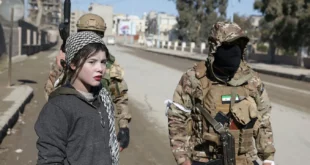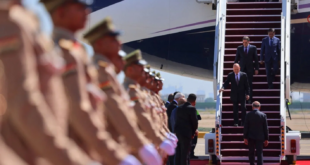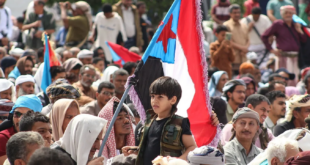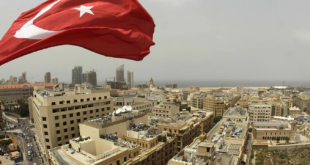The Lebanese authorities are accusing Bishop al-Hajj of treason for bringing money to the poor and the sick, at a time when Iran is delivering — through Hezbollah — money and weapons to be used in the next war against Israel.
The money and the weapons that the Iranians are sending to Lebanon are designed to strengthen the mullahs’ control over the country. Iran, incidentally, is already occupying three other Arab countries: Syria, Yemen and Iraq.
“In our days, a bishop is being arrested and interrogated as if he was a foreign agent, while Hamas leader Ismail Haniyeh is received with full honor.” — Joseph Abu Fadel, Lebanese political analyst, Twitter, July 19, 2022.
[T]he Lebanese people are being forced to seek aid from their families and relatives in Israel “because of the failure of the Lebanese states at all levels.” — Alain Dargham, reporter for MTV Lebanon News, Twitter, July 21, 2022.The Christians who fled to Israel did so out of fear for their lives and the lives of their families. They ran away from the terrorism and intimidation of Hezbollah and other terrorist groups.
If the Christian families living in Israel are able to send money and medicine to their relatives in Lebanon, it shows that those who moved to Israel are doing much better than the Christians they left behind in Lebanon.
Bishop al-Hajj is not a traitor. He is a hero to his community and the rest of the Lebanese people.
Iran and Hezbollah are afraid that such aid would open the eyes of the Lebanese people and make them realize that Israel is not their enemy. God forbid, they may even see that life in Israel is not so bad after all — and that their Israeli neighbors are prepared to help them.
The leaders of Lebanon, who have to report to their masters in Tehran, are evidently seeking to keep their people living in misery and poverty. The leaders are worried that if the people lead good and comfortable lives, they will stop thinking about violence and jihad (holy war) against Israel because they would have a lot to lose. The leaders also want their people to continue living in misery and poverty so that they can shift the blame for it to Israel.
For the past few years, the failed state of Lebanon has been experiencing one of its worst economic, political and social crises in recent history due to years of political strife and economic downfall. Yet instead of focusing their efforts on finding ways to end the crisis, the Lebanese authorities and leaders are spending their time intimidating those who seek to alleviate the suffering of the Lebanese people.
That is what happened recently with a senior Christian figure from Lebanon who tried to help the Lebanese people by providing them with money and medicine.
Last week, the cleric, Maronite Archbishop Musa al-Hajj, was detained and interrogated for several hours by the Lebanese security forces on suspicion of attempting to deliver cash and medicine to families in Lebanon. In any other country, al-Hajj would have been praised and rewarded for his charitable work and good deeds.
In his case, however, al-Hajj has been targeted by the authorities because he was trying to bring the aid from Israel.
Al-Hajj, Archbishop of Haifa and the Holy Land, was detained upon his return from a visit to Israel. He was held for 11 hours and faced an eight-hour interrogation. After al-Hajj’s passport was seized, a Lebanese military judge imposed a travel ban on the bishop, who was accused of bringing large sums of money in US dollars into Lebanon.
Many Lebanese expressed outrage over the detention of the bishop, who has been regularly visiting Israel in his capacity as head of the Maronite Church that owns property and land there. He has also been visiting Lebanese Christian Maronite families who fled to Israel over the past few decades because of the threats to their lives.
The Council of Maronite Bishops, which held an emergency meeting headed by Patriarch Bechara Boutros al-Rai, expressed its dismay at al-Hajj’s arrest.
Al-Hajj told al-Rai that all the items he was carrying with him, including medicines and aid to Lebanese families, and even his personal mobile phone, were searched without regard to his religious position.
A Lebanese judicial source told the Saudi Arab News newspaper:
"During the investigation, many medicines and a sum of money worth $460,000 were found in al-Hajj's possession. He also had a list of more than 100 Lebanese names, and next to each name was a reference to an amount of money not exceeding $500 or a reference to a medicine bag to be delivered to them."It is worth noting that the Lebanese authorities do not seem to have a problem with hundreds of millions of dollars and weapons that have long been dispatched by Iran to Hezbollah, the Iranian-backed terrorist proxy that effectively controls Lebanon.
The Lebanese authorities are accusing Bishop al-Hajj of treason for bringing money to the poor and the sick, at a time when Iran is delivering — through Hezbollah — money and weapons to be used in the next war against Israel.
The money and the weapons that the Iranians are sending to Lebanon are designed to strengthen the mullahs’ control over the country. Iran, incidentally, is already occupying three other Arab countries: Syria, Yemen and Iraq.
Many Lebanese took to social media to voice their disgust over the harassment of the bishop.
One of them, Michel Faddoul, brought the issue to the attention of the Catholic Pope Francis:
"Dear Pope, I am writing this tweet to inform you that the 'ISIS' (Islamic State) Lebanese authorities who claim to protect the rights of Christians have arrested Bishop Musa al-Hajj for 8 hours in an attempt to pressure the Church and its leader."Lebanese political analyst Joseph Abu Fadel pointed out that the detention of the bishop came while the Lebanese authorities have allowed Hamas leaders and members to enter the country freely.
"In our days, a bishop is being arrested and interrogated as if he was a foreign agent, while Hamas leader Ismail Haniyeh is received with full honor."Former Lebanese Minister of Administrative Reform May Chidiac, who survived an assassination attempt in 2005, commented on the detention of the bishop by arguing that it was not a sin for Christians who fled to Israel to send money and medicines to their families in Lebanon. Chidiac noted that Hezbollah Secretary-General Hassan Nasrallah had previously threatened to “slaughter” the Christians on the pretext of collaboration with Israel:
"In 2000, [Hezbollah leader Hassan] Nasrallah threatened: We will slaughter them in their beds! The recordings are available. Supporting their families in Lebanon with money and medicine is not a sin, but condemning them as foreign agents and arresting Bishop Musa al-Hajj is a sin."She also noted that smuggling of various types of food, medicine and other products into Lebanon takes place regularly from Syria and Iran.
Alain Dargham, a reporter for MTV Lebanon News, wrote that the Lebanese people are being forced to seek aid from their families and relatives in Israel “because of the failure of the Lebanese states at all levels.”
The issue of the Lebanese bishop is yet another example of how some Arabs are so blinded by their hatred for Israel that they reject even desperately needed aid sent by their own people, simply because of the supposed “crime” of living in Israel.
The Christians who fled to Israel did so out of fear for their lives and the lives of their families. They ran away from the terrorism and intimidation of Hezbollah and other terrorist groups.
If the Christian families living in Israel are able to send money and medicine to their relatives in Lebanon, it shows that those who moved to Israel are doing much better than the Christians they left behind in Lebanon.
Bishop al-Hajj is not a traitor. He is a hero to his community and the rest of the Lebanese people: he was willing to take the risk of transferring aid across the border from Israel into Lebanon.
Iran and Hezbollah are afraid that such aid would open the eyes of the Lebanese people and make them realize that Israel is not their enemy. God forbid, they may even see that life in Israel is not so bad after all — and that their Israeli neighbors are prepared to help them.
The leaders of Lebanon, who have to report to their masters in Tehran, are evidently seeking to keep their people living in misery and poverty. The leaders are worried that if the people lead good and comfortable lives, they will stop thinking about violence and jihad (holy war) against Israel because they would have a lot to lose. The leaders also want their people to continue living in misery and poverty so that they can shift the blame towards Israel.
“The destructive actions of Lebanon’s political and financial leaders are responsible for forcing most of the country’s population into poverty, in violation of international human rights law, the UN Special Rapporteur on extreme poverty and human rights, Olivier De Schutter, said in a report.
“Impunity, corruption, and structural inequality have been baked into a venal political and economic system designed to fail those at the bottom, but it doesn’t have to be that way,” said De Schutter, an independent expert appointed by the UN Human Rights Council.
"The political establishment knew about the looming cataclysm for years but did little to avert it. Well-connected individuals even moved their money out of the country, facilitated by a legal vacuum that allowed capital to flow out of the country. Truth and accountability must be sought as a matter of human rights...
"Political leadership is completely out of touch with reality, including with the desperation they've created by destroying people's lives. Lebanon is also one of the most unequal countries in the world, yet leadership seems unaware of this at best, and comfortable with it at worst." Eurasia Press & News
Eurasia Press & News




